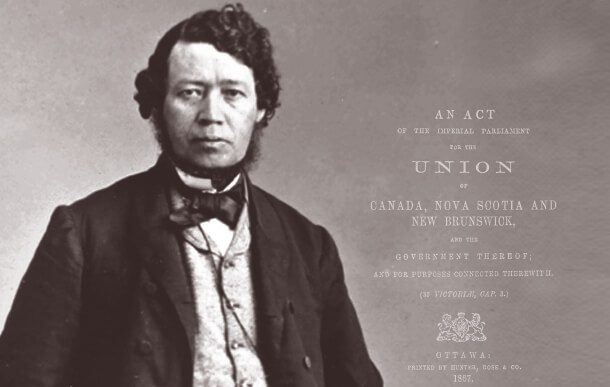Latest entry in the Confederation Series shows Thomas D’Arcy McGee was an advocate for the federal union of British North America, a defender of minority rights within Confederation, and an ardent opponent of religious and national sectarianism
OTTAWA, June 8, 2017 – The Macdonald-Laurier Institute is pleased to showcase the fourth paper of its Confederation Series, written by Munk Senior Fellow Alastair Gillespie, with a foreword by Bob Rae, former premier of Ontario and interim leader of the Liberal Party of Canada.
This paper examines Thomas D’Arcy McGee’s role in the birth of Confederation as an advocate for the federal union of British North America, a defender of minority rights within Confederation, and an ardent opponent of religious and national sectarianism.
To read the full paper, titled “Thomas D’Arcy McGee: The Idealist,” click here.
A pioneering Canadian nationalist, McGee envisioned a “New Nationality” for Canada – devoting his career as a journalist, public speaker, and politician to the idea that Canadians could form a new federal union in North America. Long known as the “poet of Confederation,” McGee’s outstanding eloquence in the cause of his young country still has the power to inspire Canadians today.
McGee’s vision for Canada embraced Canada’s early diversity – with a people of diverse national origins, McGee argued Canada must be united by an ethic of justice. Writing in his New Era newspaper shortly after his arrival in Canada from his native Ireland, McGee argued “justice between class and class, and Province and Province, between creed and creed, between man and man, this must constitute the glory, the safety, and the strength of this new country.”
Nine years later, as a cabinet minister in the coalition government that delivered Confederation, McGee remained fixed on the idea that Canadians must look beyond old-world national ties, asking: “Whose words are these – ‘God hath made of one blood all the nations that dwell on the face of the earth?’” A representative of the Irish-Canadian community of Montreal, McGee nevertheless spoke out against hyphenated Canadianism: “A Canadian nationality, not French-Canadian, nor British-Canadian, nor Irish-Canadian – patriotism rejects the prefix.”
A federalist by conviction, McGee believed federalism supported freedom, and that self-government in the provinces would encourage loyalty to the new Canadian federation. McGee also believed national unity would secure to Canada deep reservoirs of political moderation, memorably writing “unity is to liberty as the cistern in the desert is to the seldom sent shower.”
The only Father of Confederation to be assassinated, McGee paid the ultimate price for his longstanding campaign against the violent extremism of the Fenian brotherhood. He stepped into the night on April 6, 1868, after giving a final speech in the House of Commons saying a leader must be prepared to “sacrifice himself” in the cause of Confederation: “I, Sir, who have been, and still am, its warm and earnest advocate, speak here not as the representative of any Province, but as thoroughly and emphatically a Canadian…”
The McGee paper will be followed by the concluding paper of the Confederation Series on Sir John A. Macdonald.
To support the Confederation Series, MLI established The Confederation Project, an online resource to publish and collect the speeches featured in the papers. Thomas D’Arcy McGee’s speech in the Confederation Debates can be downloaded here. Other speeches, together with the previous three papers in the Confederation Series, are available on the Confederation Project webpage, with additional items to be released in coming weeks.
***
Alastair Gillespie is an MLI Munk Senior Fellow and a capital markets lawyer in the London office of a large New York-based international law firm. Prior to his legal career, Alastair was Special Assistant to the Hon. A. Anne McLellan, Deputy Prime Minister of Canada and Minister of Public Safety and Emergency Preparedness.
The Macdonald-Laurier Institute is the only non-partisan, independent national public policy think tank in Ottawa focusing on the full range of issues that fall under the jurisdiction of the federal government.
For more information, please contact Mark Brownlee, communications manager, at 613-482-8327 x105 or email at mark.brownlee@macdonaldlaurier.ca.





